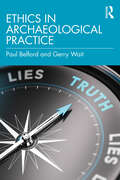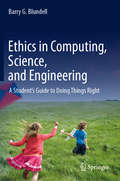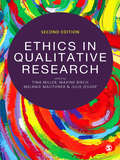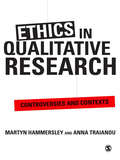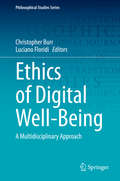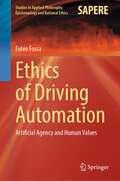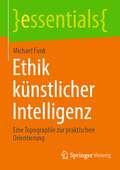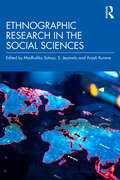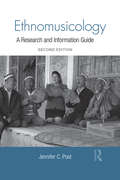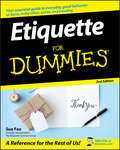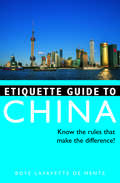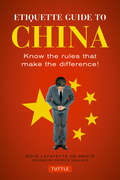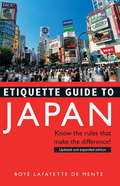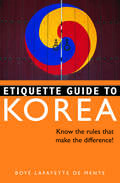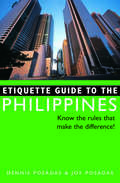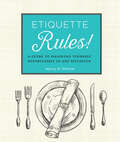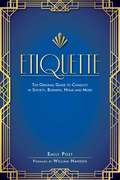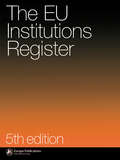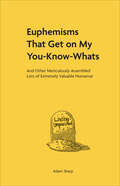- Table View
- List View
Ethics in Archaeological Practice
by Paul Belford Gerry WaitEthics in Archaeological Practice focuses on the ethics of archaeological work in a European context.This book covers all aspects of the archaeological profession, including archaeological advisors employed by state national, or regional heritage agencies, commercial archaeologists (consultants and contractors), and academics. It considers all archaeologists as professionals and situates ethical practice at the heart of what it means to be a professional archaeologist. It works as a practical handbook organised around the main areas of activity that archaeologists undertake allowing the book to be used as a reference work when required.Ethics in Archaeological Practice will appeal to professional archaeologists, academics and students, as well as those involved in professional training.
Ethics in Computing, Science, and Engineering: A Student’s Guide to Doing Things Right
by Barry G. BlundellThis comprehensive textbook introduces students to the wide-ranging responsibilities of computing, science and engineering professionals by laying strong transdisciplinary foundations and by highlighting ethical issues that may arise during their careers. The work is well illustrated, and makes extensive use of both activities, and ethical dilemmas which are designed to stimulate reader engagement. A number of memorable case studies are also included and frequently draw on the demanding aerospace industry. The book adopts a strongly human centric approach, with matters such as privacy erosion and censorship being viewed not only in their current context but also in terms of their ongoing evolution. What are our individual ethical responsibilities for ensuring that we do not develop for future generations a technological leviathan with the potential to create a dystopian world? A broad range of technologies and techniques are introduced and are examined within an ethical framework. These include biometrics, surveillance systems (including facial recognition), radio frequency identification devices, drone technologies, the Internet of Things, and robotic systems. The application and potential societal ramifications of such systems are examined in some detail and this is intended to support the reader in gaining a clear insight into our current direction of travel. Importantly, the author asks whether we can afford to allow ongoing developments to be primarily driven by market forces, or whether a more cautious approach is needed. Further chapters examine the benefits that are associated with ethical leadership, environmental issues relating to the technology product lifecycle (from inception to e-waste), ethical considerations in research (including medical experimentation involving both humans and animals), and the need to develop educational programs which will better prepare students for the needs of a much more fluid employment landscape. The final chapter introduces a structured approach to ethical issue resolution, providing a valuable, long-term source of reference. In addition it emphasises the ethical responsibilities of the professional, and considers issues that can arise when we endeavour to effect ethically sound change within organisations. Examples are provided which highlight the possible ramifications of exercising ethical valour. The author has thus created an extensively referenced textbook that catalyses student interest, is internationally relevant, and which is multicultural in both its scope and outlook.
Ethics in Public Health and Health Policy: Concepts, Methods, Case Studies
by Irene Hirschberg Daniel Strech Georg MarckmannEthical issues associated with public health and health policy--related, for example, to pandemic plans and vaccination policies (c.f. SARS or pandemic influenza), preventive measures like screening (e.g. for breast cancer or dementia) or health information campaigns, social inequalities or health care rationing--are increasing in worldwide importance. Evidence-based information for valid benefit-harm assessment is often rare and hard to get for participants in public health interventions. Program implementation often disregards requirements of fair decision-making processes (like public participation, transparency, etc.). Originating from an international conference (based on a call for abstracts and external review), this volume contains contributions from a group of experts from multiple disciplines and countries. It covers (i) conceptual foundations of public health ethics, (ii) methodological approaches and (iii) normative analyses of specific issues and cases. Bridging theoretical foundations with practical applications, this volume provides a valuable resource for researchers, practitioners and students concerned with public health practice and policy.
Ethics in Qualitative Research
by Tina Miller Dr Melanie Mauthner Julie Jessop Maxine BirchThis fresh, confident second edition expands its focus on the theoretical and practical aspects of doing qualitative research in light of new ethical dilemmas facing researchers today. In a climate of significant social and technological change, researchers must respond to increased ethical regulation and scrutiny of research. New sources, types of data and modes of accessing participants are all challenging and reconfiguring traditional ideas of the research relationship. This engaging textbook explores key ethical dilemmas - including research boundaries, informed consent, participation, rapport and analysis - within the context of a rapidly changing research environment. The book effectively covers the ethical issues related to the data collection process, helping readers to address the ethical considerations relevant to their research. This fully updated new edition: - Maps the changing and increasingly technology-reliant aspects of research relationships and practices - Provides researchers with guidance through practical examples, enabling those engaged in qualitative research to question and navigate in ethical ways This book is essential reading for all those engaged in qualitative research across the social sciences.
Ethics in Qualitative Research: Controversies and Contexts
by Martyn Hammersley Anna TraianouAll social researchers need to think about ethical issues. Their salience has recently been increased by the pressures of ethical regulation, particularly in the case of qualitative research. But what are ethical issues? And how should they be approached? These are not matters about which there is agreement. Ethics in Qualitative Research explores conflicting philosophical assumptions, the diverse social contexts in which ethical problems arise, and the complexities of handling them in practice. The authors argue that the starting point for any discussion of research ethics must be the values intrinsic to research, above all the commitment to knowledge-production. However, the pursuit of inquiry is rightly constrained by external values, and the book focuses on three of these: minimising harm, respecting autonomy, and protecting privacy. These external values are shown to be far from unequivocal in character, often in conflict with one another (or with the commitments of research), and always subject to situational interpretation and practical judgment. Nevertheless, it is contended that in the present challenging times it is essential that qualitative researchers uphold research values. Martyn Hammersley is Professor of Educational and Social Research at The Open University. Anna Traianou is Senior Lecturer in the Department of Educational Studies, Goldsmiths, University of London.
Ethics of Artificial Intelligence: Case Studies and Options for Addressing Ethical Challenges (SpringerBriefs in Research and Innovation Governance)
by Doris Schroeder Rowena Rodrigues Bernd Carsten StahlThis open access collection of AI ethics case studies is the first book to present real-life case studies combined with commentaries and strategies for overcoming ethical challenges. Case studies are one of the best ways to learn about ethical dilemmas and to achieve insights into various complexities and stakeholder perspectives. Given the omnipresence of AI ethics in academic, policy and media debates, the book will be suitable for a wide range of audiences, from scholars of different disciplines (e.g. AI science, ethics, politics, philosophy, economics) to policy-makers, lobbying NGOs, teachers and the educated public.
Ethics of Digital Well-Being: A Multidisciplinary Approach (Philosophical Studies Series #140)
by Luciano Floridi Christopher BurrThis book brings together international experts from a wide variety of disciplines, in order to understand the impact that digital technologies have had on our well-being as well as our understanding of what it means to live a life that is good for us. The multidisciplinary perspective that this collection offers demonstrates the breadth and importance of these discussions, and represents a pivotal and state-of-the-art contribution to the ongoing discussion concerning digital well-being. Furthermore, this is the first book that captures the complex set of issues that are implicated by the ongoing development of digital technologies, impacting our well-being either directly or indirectly. By helping to clarify some of the most pertinent issues, this collection clarifies the risks and opportunities associated with deploying digital technologies in various social domains.Chapter 2 is available open access under a Creative Commons Attribution 4.0 International License via link.springer.com.
Ethics of Driving Automation: Artificial Agency and Human Values (Studies in Applied Philosophy, Epistemology and Rational Ethics #65)
by Fabio FossaThis book offers a systematic and thorough philosophical analysis of the ways in which driving automation crosses path with ethical values. Upon introducing the different forms of driving automation and examining their relation to human autonomy, it provides readers with in-depth reflections on safety, privacy, moral judgment, control, responsibility, sustainability, and other ethical issues. Driving is undoubtedly a moral activity as a human act. Transferring it to artificial agents such as connected and automated vehicles necessarily raises many philosophical questions. When driving is automated, what happens to its ethical dimensions? Could artificial agents accomplish ethical objectives on our behalf, take moral decisions in our place, and drive us into a more ethical transportation future? In doing so, would they be “moral” as we are or in a way that is similar to, but also remarkably different from, our own? And what role is yet to be played by human responsibility and commitment? The book addresses these questions with the aim of stimulating an interdisciplinary dialogue between different stakeholders. They include automotive engineers, computer scientists, and moral philosophers, as well as industry representatives, policymakers, regulators, transportation experts, and the general public. Indeed, connected and automated vehicles will not take the high road for us . We must drive them there.
Ethics, Governance, and Policies in Artificial Intelligence (Philosophical Studies Series #144)
by Luciano FloridiThis book offers a synthesis of investigations on the ethics, governance and policies affecting the design, development and deployment of artificial intelligence (AI). Each chapter can be read independently, but the overall structure of the book provides a complementary and detailed understanding of some of the most pressing issues brought about by AI and digital innovation. Given its modular nature, it is a text suitable for readers who wish to gain a reliable orientation about the ethics of AI and for experts who wish to know more about specific areas of the current debate.
Ethik künstlicher Intelligenz: Eine Topographie zur praktischen Orientierung (essentials)
by Michael FunkKünstliche Intelligenz ist zum vielschichtigen Gegenstand ethischer Debatten geworden. Ob Richtlinien fairer Digitalisierung und vertrauenswürdiger Algorithmen, Gestaltung nachhaltiger Geschäftsmodelle, informatische Grundbildung in Schulen oder Existenzfragen freiheitlich-demokratischer Gesellschaften – KI-Ethik steht vor komplexen Herausforderungen. Grundsätzlicher Klärungsbedarf entsteht durch die verschiedenen Zugänge, Interessen und Begrifflichkeiten, die aufeinandertreffen. Vorliegendes essential präsentiert auf zugängliche Weise wissenschaftliches Überblickswissen zur KI-Ethik. Als praktische Orientierungshilfe im komplexen Terrain dient eine thematische Topographie, einschließlich zentraler Begriffe. Zusammenhänge zwischen Industrie 5.0, Regulierung, Post- und Transhumanismus, selbstfahrenden Autos, moralischen Maschinen, nachhaltiger Digitalisierung oder dem Anthropozän werden mit Blick auf KI-Ethik systematisch sichtbar gemacht.
Ethnographic Research in the Social Sciences
by Madhulika Sahoo S. Jeyavelu Anjali KuraneThis book is an essential guide to scientifically conducting contemporary ethnographic research at undergraduate, postgraduate, and doctoral levels in the social sciences, the humanities, and business studies. It addresses the methodological challenges of ethnographic research across the social sciences and highlights present time research areas, including digital ethnography, artificial intelligence, classroom pedagogy, hybrid organization, and many more. This volume is divided into three parts and can be a single source of reference that— • Guides students through essential theoretical and conceptual aspects of ethnography; • Demonstrates the usage of ethnography in allied disciplines—psychology, healthcare, international border studies, linguistic, artificial intelligence, and organizational behaviour; • Demonstrates the application of ethnographic research in the field; • Presents valuable lessons from fieldwork experiences by different scholars across a variety of communities; • Includes dos and don’ts for early career and first-time researchers. A step-by-step guide with student-friendly text, this book will be an essential supplementary reading across the social sciences and the humanities, especially for those conducting fieldwork in the Global South.
Ethnomusicology: A Research and Information Guide (Routledge Music Bibliographies)
by Jennifer PostFirst published in 2011. Routledge is an imprint of Taylor & Francis, an informa company.
Etiquette For Dummies
by Sue FoxLife is full of moments when you don't know how to act or how to handle yourself in front of other people. In these situations, etiquette is vital for keeping your sense of humor and your self-esteem intact. But etiquette is not a behavior that you should just turn on and off. This stuffy French word that translates into getting along with others allows you to put people at ease, make them feel good about a situation, and even improve your reputation.Etiquette For Dummies approaches the subject from a practical point of view, throwing out the rulebook full of long, pointless lists. Instead, it sets up tough social situations and shows you how to navigate through them successfully, charming everyone with your politeness and social grace. This straightforward, no-nonsense guide will let you discover the ins and outs of:Basic behavior for family, friends, relationships, and businessGrooming, dressing, and staying healthyCoping with unexpected stuff like sneezing or feeling queasyMaintaining a civilized relationshipMaking friends and keeping themBuilding positive relationships at workCommunicating effectivelyThis book shows you how to take on these situations and make them pleasant. It also gives you great advice for tipping appropriately in all types of services and setting stellar examples for your kids. Full of useful advice and written in a laid-back, friendly style, Etiquette For Dummies has all the tools you need to face any social situation with politeness and courtesy.
Etiquette Guide to China
by Boye Lafayette De MenteSay farewell to faux pas!Whether you're traveling for business or pleasure, or whether your stay will be long or short, your visit to China will be more pleasurable and productive if you understand your host culture and how to work within it. Etiquette Guide to China is a vital guide for businessmen, tourists, or students travelling to china.Learn the essentials of interacting, such as manners and etiquette such as how to address people you meet, body language such as if you should bow or shake hands, and how to behave out on the town, in the boardroom or when attending a wedding. Filled with practical advice on minding your manners in China, Etiquette Guide to China is an indispensible book to read before you travel to china or conduct business and trade with China.The author, Boye Lafayette De Mente worked in Asia for over thirty years as a journalist and business consultant and has long been considered an authority on East Asian business and the culture of China. In this book, he reveals the historical factors, collective traits and individual qualities that determine how the Chinese interact and do business.
Etiquette Guide to China: Know the Rules that Make the Difference!
by Boye Lafayette De Mente Patrick WallaceThis essential guide to Chinese etiquette will make embarrassing social blunders a thing of the past! It provides the latest etiquette in mobile phone manners, texting, social media and other forms of digital communication. The glossary at the back of the book has been revised to include the latest technology-related words and expressions used by China today. Two new chapters address the changing role of foreigners in the workplace and the contemporary business style and etiquette used by the younger generation of China who are now increasingly cosmopolitan-but still very Chinese!Etiquette Guide to China includes everything you need to know to be a successful, courteous traveler: Hand gestures and body language How to address the Chinese Dining and restaurant manners Gift giving and celebration in China Entering into and understanding business relationships How to behave in professional situations Dealing with China's political culture The Chinese way of negotiating
Etiquette Guide to Japan
by Boye Lafayette De MenteFarewell to faux pas!Minding your manners is an acquired skill, but what serves you well elsewhere could trip you up in Japan. Save yourself possible embarrassment with Etiquette Guide to Japan. An inside look at Japanese social graces, it answers all the questions of the thoughtful traveler.Although often overshadowed by a modern facade, long-standing traditional aspects of Japan's culture still influence the country and almost everyone in it. Concrete evidence of this traditional culture can be seen everywhere.To many Western visitors, however, the most obvious example of this traditional culture's strength is the unique etiquette of the Japanese. Like many nations, Japan has experienced vast political, social, and economic change over the past century. But enough of Japan's traditional etiquette remains to set the Japanese apart socially and psychologically, and to make success in socializing and doing business with them a special challenge for Westerners.This updated and expanded edition of the classic etiquette guide addresses all the newest developments, trends and protocols that every traveler needs to know, from the tea ceremony to the subway to the bathroom.
Etiquette Guide to Korea
by Boye Lafayette De MenteFarewell to faux pas!South Korea is one of the greatest economic success stories of the past 60 years, and more and more Westerners are traveling to this bustling, modern country for business and pleasure. But no matter why you visit, an understanding of Korea's etiquette and culture is essential to an enjoyable and successful trip.Known as "the Hermit Kingdom" until the final decades of the ninteenth century because it kept its doors closed to the outside world, Korea wasn't exposed to international influences until the mid-twentieth century. Perhaps this is why may of the traditional aspects of Korea's culture have been preserved in spite of the explosion of modernity in recent times. Today Korea's age-old culture has combined with the ultramodern Western ways and conveniences to transform the country into one of the world's most popular destinations.This authoritative guide covers everything the courteous traveler needs to know, including the importance of names and how to use them, shaking hands versus bowing, table manners for celebrations and everyday meals, and how to negotiate in Korea.Also included are invaluable lists of Korean vocabulary and helpful phrases, making this book the most important asset for your trip or extended stay in Korea.
Etiquette Guide to Philippines
by Joy PosadasNever fear social blunders again with this essential guide to Filipino etiquette!Whether visiting for business or pleasure, knowledge of the local customs and traditions will help make the most of your trip to the Philippines. Covering a variety of topics—from how to greet new people to how one is expected to behave during formal events, business meetings and nights out on the town—Etiquette Guide to the Philippines is an indispensable companion for the courteous traveler.
Etiquette Guide to Philippines
by Joy PosadasNever fear social blunders again with this essential guide to Filipino etiquette!Whether visiting for business or pleasure, knowledge of the local customs and traditions will help make the most of your trip to the Philippines. Covering a variety of topics—from how to greet new people to how one is expected to behave during formal events, business meetings and nights out on the town—Etiquette Guide to the Philippines is an indispensable companion for the courteous traveler.
Etiquette Guide to Philippines
by Joy PosadasNever fear social blunders again with this essential guide to Filipino etiquette!Whether visiting for business or pleasure, knowledge of the local customs and traditions will help make the most of your trip to the Philippines. Covering a variety of topics—from how to greet new people to how one is expected to behave during formal events, business meetings and nights out on the town—Etiquette Guide to the Philippines is an indispensable companion for the courteous traveler.
Etiquette Rules!: A Guide to Handling Yourself Effortlessly in Any Situation
by Nancy R. MitchelA comprehensive field guide to modern manners, including social skills, phones & social media, the workplace, dining, weddings, and more.Good manners are the hallmark of a well-rounded person, and are a character trait that can benefit one socially and professionally. However, a lot has changed since the first etiquette guides were published almost a century ago, with modern etiquette encompassing so much more than simply being able to identify between a chowder and consommé spoon.To step in and guide readers is Nancy R. Mitchell, who, for more than thirty-five years, has been an etiquette consultant and trainer for numerous institutions and corporations. From revealing the secrets behind successful networking and job interviews, to decoding proper dining habits, to wedding decorum, Etiquette Rules! succinctly gives readers everything they need to successfully maneuver with manners in today’s world.Praise for Etiquette Rules!“An excellent general primer for a young woman entering the workplace.” —The New York Times“In a world where reading news headlines would have you believe it has gone to hell in a hand-basket, it is nice to see someone making the effort to uphold some common civility and manners which, though they might be updated now for same-sex weddings, work cubicles or food trucks, are never out of style.” —DearAuthor.com
Etiquette: The Original Guide to Conduct in Society, Business, Home, and More
by Emily PostFirst published in 1922, Etiquette has served for generations as the premiere guide to manners and decorum. It details the nuances of various social settings as well as how to act within them, so as not to offend any parties present.Different settings often call for different conduct. In addition to covering general forms of communication, salutations, greetings, and conversation, this classic manual also details what behaviors and topics are socially acceptable (and unacceptable) at specific events such as weddings, formal dinners, engagements, funerals, christenings, games and sports, business and politics, ball and dances, and many, many more. It will teach you the contemporary time period’s sense of how an individual should conduct oneself, offering tips and tricks long forgotten in an age of impulse, social awkwardness, and conversational disrepair, condoned by our reliance on technology.Featuring a new foreword by a leading etiquette consultant, pick up a copy of this stunning new edition of Etiquette—start improving your charm and conversational skills today!
Eu Institutions Register
by EuropaDetails of over 5,900 key personnel in each of the major institutions, including: European Commission, European Parliament, Economic and Social Committee, Council of the European Union, Court of Justice, European Investment Bank, Court of Auditors, Committee of Regions and EU Agencies.
Euphemisms That Get on My You-Know-Whats: And Other Meticulously Assembled Lists of Extremely Valuable Nonsense
by Adam SharpEver wondered what the Mandarin word for platypus translates to? Probably not, but it&’s &“duck mouth beast.&” And there&’s more where that came from, thanks to Adam Sharp&’s Euphemisms That Get on My You-Know-Whats, a collection of fascinating, hilarious, and brilliantly odd lists.This book covers just about everything you never knew you didn&’t know, from the noises that animals make around the world to titles of movies that sound dirty but aren&’t—and much more. Whether you revel in trivia, desire more creative ways to curse your foes, or simply enjoy the structure of a good list, you&’ll love the weird genius of Euphemisms That Get on My You-Know-Whats.
Eureka!
by Wagman-Geller MarleneThe fascinating inspirations behind common inventions and creations- from Barbie to Sweet and Low to Mt. Rushmore. The slinky was born aboard a World War II ship. The Barbie doll was inspired by a German sex toy. Weight Watchers began with a Jewish housewife in Queens, New York. Eureka! explores the fascinating stories behind these famous creations and many others-from blue jeans to the Taj Mahal to Mickey Mouse-detailing the relationships between inspirations and their inventors. Readers will delight in the intriguing-and sometimes surprising-origins behind the ideas that have shaped the world. .
